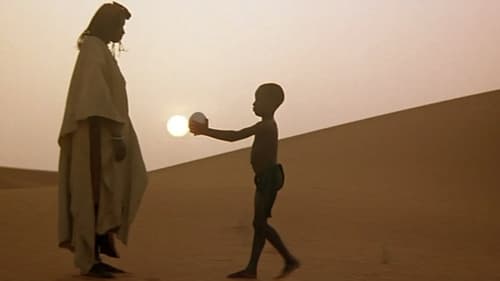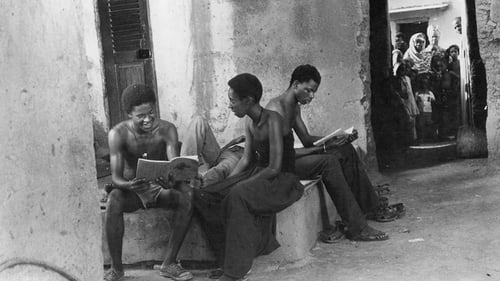Souleymane Cissé
출생 : 1940-04-21, Bamako, Mali
약력
Souleymane Cissé is a Malian film director. In 1975 he shot Den Muso (The Young Girl), the first full length Malian feature in the Bambara language. It was immediately banned by the government. Then followed Baara (Work) in 1977, Finyè (The Wind) in 1981, and Yeelen (Brightness), Prix du Jury in Cannes in 1987.

Writer
Bamako. Several women are illegally evicted from their home in 2008. Their brother, Souleymane Cissé, takes up his camera to look back at his childhood and family history in a country heading for war despite a tradition of tolerance.

Director
Bamako. Several women are illegally evicted from their home in 2008. Their brother, Souleymane Cissé, takes up his camera to look back at his childhood and family history in a country heading for war despite a tradition of tolerance.

Director
Thirteen filmmakers talk about Henri Langlois and their relationship with him.

Self
Thirteen filmmakers talk about Henri Langlois and their relationship with him.

Director
Meeting of two greats, Cissé's tribute to the dean of African cinema is without discours, without pathos. It is the one returned by his mini camera, which attends the funeral ceremonies that marked the departure of Ousmane Sembene in Dakar, and finds the relatives of Sembene in the house he had built in Yoff, directly on rocks beaten by the ocean. These simple and close images, with a distance from the ceremonial that Sembene would have appreciated, those briefly borrowed from his films and archives, weave a film full of friendship and fraternity.

Writer
A Westernized filmmaker, Issa, is a polygamist whose third wife Mimi is a doctor and high-profile health minister. Accustomed to a certain degree of empowerment and independence from her husband (deciding to stay in her own house instead of moving into his household), Mimi carries on a not-too-subtle affair with the married Abba, a fishmonger who sends her a tell-tale case of fish after each encounter as a token of his affection. Confronted by Issa with his suspicions of infidelity after he finds Abba in the courtyard, Mimi decides to file for divorce, a move that soon brings on a new set of complications, as relatives plead for reconciliation to avoid the shame, Issa's second wife increasingly resents the attention paid to Mimi, and Abba's wife begins to grow suspicious of Mimi's role in her husband's life.

Director
A Westernized filmmaker, Issa, is a polygamist whose third wife Mimi is a doctor and high-profile health minister. Accustomed to a certain degree of empowerment and independence from her husband (deciding to stay in her own house instead of moving into his household), Mimi carries on a not-too-subtle affair with the married Abba, a fishmonger who sends her a tell-tale case of fish after each encounter as a token of his affection. Confronted by Issa with his suspicions of infidelity after he finds Abba in the courtyard, Mimi decides to file for divorce, a move that soon brings on a new set of complications, as relatives plead for reconciliation to avoid the shame, Issa's second wife increasingly resents the attention paid to Mimi, and Abba's wife begins to grow suspicious of Mimi's role in her husband's life.

Producer
Beginning in South Africa under the apartheid regime, the film follows a young girl who flees the country after a violent confrontation with a local white landowner in which her father is killed. She settles in Abidjan, where, ten years later, she has become a university student. As part of her studies, she visits the Taureg tribe on the edge of the Sahara before at last returning to post-Apartheid South Africa.

Writer
Beginning in South Africa under the apartheid regime, the film follows a young girl who flees the country after a violent confrontation with a local white landowner in which her father is killed. She settles in Abidjan, where, ten years later, she has become a university student. As part of her studies, she visits the Taureg tribe on the edge of the Sahara before at last returning to post-Apartheid South Africa.

Director
Beginning in South Africa under the apartheid regime, the film follows a young girl who flees the country after a violent confrontation with a local white landowner in which her father is killed. She settles in Abidjan, where, ten years later, she has become a university student. As part of her studies, she visits the Taureg tribe on the edge of the Sahara before at last returning to post-Apartheid South Africa.

Malian filmmaker Souleymane Cissé reveals his passion for cinema, Africa and the world to Cambodian director Rithy Panh.

Producer
자신을 위해 힘을 쓰는 마법사 소마는 아들 니아난코로가 자신을 죽게 하리라는 계시를 받은 후 아들을 죽이려 한다. 어머니의 도움으로 니아난코로는 마을을 빠져나가지만, 소마는 마법의 힘으로 아들을 뒤쫓는다. 말리 공화국의 밤바라족에 내려오는 전설을 바탕으로 한 신비한 작품. 말리 출신의 아프리카 영화의 거장 술레이만 시세의 대표 걸작. (2018 아프리카개발은행 연차총회 기념 - 아프리카 영화제) 칸영화제 경쟁부문에 처음 소개된 흑아프리카 영화이자 세계영화사의 걸작. 니아만코로는 질투심많은 마법사인 아버지를 피해 자라난다. 성인이 된 그는 마법의 힘을 얻기 위한 여정에 오르고 중간에 포로가 되는 등 우여곡절을 겪는다. 마지막으로 아버지와의 대결이 그를 기다리고 있다. (2016년 제21회 부산국제영화제)

Writer
자신을 위해 힘을 쓰는 마법사 소마는 아들 니아난코로가 자신을 죽게 하리라는 계시를 받은 후 아들을 죽이려 한다. 어머니의 도움으로 니아난코로는 마을을 빠져나가지만, 소마는 마법의 힘으로 아들을 뒤쫓는다. 말리 공화국의 밤바라족에 내려오는 전설을 바탕으로 한 신비한 작품. 말리 출신의 아프리카 영화의 거장 술레이만 시세의 대표 걸작. (2018 아프리카개발은행 연차총회 기념 - 아프리카 영화제) 칸영화제 경쟁부문에 처음 소개된 흑아프리카 영화이자 세계영화사의 걸작. 니아만코로는 질투심많은 마법사인 아버지를 피해 자라난다. 성인이 된 그는 마법의 힘을 얻기 위한 여정에 오르고 중간에 포로가 되는 등 우여곡절을 겪는다. 마지막으로 아버지와의 대결이 그를 기다리고 있다. (2016년 제21회 부산국제영화제)

Director
자신을 위해 힘을 쓰는 마법사 소마는 아들 니아난코로가 자신을 죽게 하리라는 계시를 받은 후 아들을 죽이려 한다. 어머니의 도움으로 니아난코로는 마을을 빠져나가지만, 소마는 마법의 힘으로 아들을 뒤쫓는다. 말리 공화국의 밤바라족에 내려오는 전설을 바탕으로 한 신비한 작품. 말리 출신의 아프리카 영화의 거장 술레이만 시세의 대표 걸작. (2018 아프리카개발은행 연차총회 기념 - 아프리카 영화제) 칸영화제 경쟁부문에 처음 소개된 흑아프리카 영화이자 세계영화사의 걸작. 니아만코로는 질투심많은 마법사인 아버지를 피해 자라난다. 성인이 된 그는 마법의 힘을 얻기 위한 여정에 오르고 중간에 포로가 되는 등 우여곡절을 겪는다. 마지막으로 아버지와의 대결이 그를 기다리고 있다. (2016년 제21회 부산국제영화제)

Producer
레티는 쉴 새 없이 부는 바람을 뚫고 사촌이 사는 텍사스로 간다. 기차에서 만난 로디는 바람은 여자를 미치게 만든다며 레티를 겁주면서도 그녀를 유혹한다. 도착 후, 로디는 레티에게 다시 만날 것을 약속하며 떠나고, 레티는 마중 나온 사촌의 이웃 리게와 목장으로 향한다. 모두들 레티를 반기지만, 사촌의 아내 코라만은 레티를 탐탁잖게 여기고, 레티를 쫓아내려 한다. 스웨덴 출신으로 무성영화시대 최고의 감독 중 한 명인 빅터 쇠스트롬과 완벽히 절제된 연기로 무성영화시대의 여신이라 불리는 릴리언 기쉬가 함께 작업하였으며, 두 사람의 마지막 무성영화이자 쇠스트롬의 대표작이다. (2011년 시네마테크부산 - 월드시네마 VIII)

Writer
레티는 쉴 새 없이 부는 바람을 뚫고 사촌이 사는 텍사스로 간다. 기차에서 만난 로디는 바람은 여자를 미치게 만든다며 레티를 겁주면서도 그녀를 유혹한다. 도착 후, 로디는 레티에게 다시 만날 것을 약속하며 떠나고, 레티는 마중 나온 사촌의 이웃 리게와 목장으로 향한다. 모두들 레티를 반기지만, 사촌의 아내 코라만은 레티를 탐탁잖게 여기고, 레티를 쫓아내려 한다. 스웨덴 출신으로 무성영화시대 최고의 감독 중 한 명인 빅터 쇠스트롬과 완벽히 절제된 연기로 무성영화시대의 여신이라 불리는 릴리언 기쉬가 함께 작업하였으며, 두 사람의 마지막 무성영화이자 쇠스트롬의 대표작이다. (2011년 시네마테크부산 - 월드시네마 VIII)

Director
레티는 쉴 새 없이 부는 바람을 뚫고 사촌이 사는 텍사스로 간다. 기차에서 만난 로디는 바람은 여자를 미치게 만든다며 레티를 겁주면서도 그녀를 유혹한다. 도착 후, 로디는 레티에게 다시 만날 것을 약속하며 떠나고, 레티는 마중 나온 사촌의 이웃 리게와 목장으로 향한다. 모두들 레티를 반기지만, 사촌의 아내 코라만은 레티를 탐탁잖게 여기고, 레티를 쫓아내려 한다. 스웨덴 출신으로 무성영화시대 최고의 감독 중 한 명인 빅터 쇠스트롬과 완벽히 절제된 연기로 무성영화시대의 여신이라 불리는 릴리언 기쉬가 함께 작업하였으며, 두 사람의 마지막 무성영화이자 쇠스트롬의 대표작이다. (2011년 시네마테크부산 - 월드시네마 VIII)

Director
In Rennes, as part of the 5th Traditional Arts Festival in 1978, storytellers and musicians from the Seychelles islands express their concern with modernism and the disinterest of young people in traditional music.

Director
A young manager of a factory encounters a man walking along a road who says his family traditionally are servants to the manager's family. The manager offers him a job, and as he watches out for the other man's welfare, begins to see how the company mistreats its workers. The manager is challenged between his ethics and the pressure from others to protect his own interests as dire problems surface at the factory

Writer
A young manager of a factory encounters a man walking along a road who says his family traditionally are servants to the manager's family. The manager offers him a job, and as he watches out for the other man's welfare, begins to see how the company mistreats its workers. The manager is challenged between his ethics and the pressure from others to protect his own interests as dire problems surface at the factory

Dialogue
A young mute woman is raped and becomes pregnant, with disastrous consequences within her family. The film also sketches the social/economic situation in urban Mali in the 1970s, particularly in relation to the treatment of women.

Script
A young mute woman is raped and becomes pregnant, with disastrous consequences within her family. The film also sketches the social/economic situation in urban Mali in the 1970s, particularly in relation to the treatment of women.

Director
A young mute woman is raped and becomes pregnant, with disastrous consequences within her family. The film also sketches the social/economic situation in urban Mali in the 1970s, particularly in relation to the treatment of women.

Writer
"Cinq jours d’une vie" is about a young man, N'Tji, orphaned at an early age, who lives under the supervision of his uncle. He is sent to Koranic school, where he is forced to memorize and recite verses of the Koran; soon, N’Tji escapes and begins to craft his own destiny. Unfortunately, he is found and thrown in prison, and must live with the implications upon release. In this film, Cissé explores the institution of the Koranic school and its detrimental effects on young people’s autonomy and ability to explore their futures.

Director
"Cinq jours d’une vie" is about a young man, N'Tji, orphaned at an early age, who lives under the supervision of his uncle. He is sent to Koranic school, where he is forced to memorize and recite verses of the Koran; soon, N’Tji escapes and begins to craft his own destiny. Unfortunately, he is found and thrown in prison, and must live with the implications upon release. In this film, Cissé explores the institution of the Koranic school and its detrimental effects on young people’s autonomy and ability to explore their futures.

Director

Director
A portrait of the Malian artist Mamadou Somé Coulibaly who draws his inspiration from the history of the African people.



